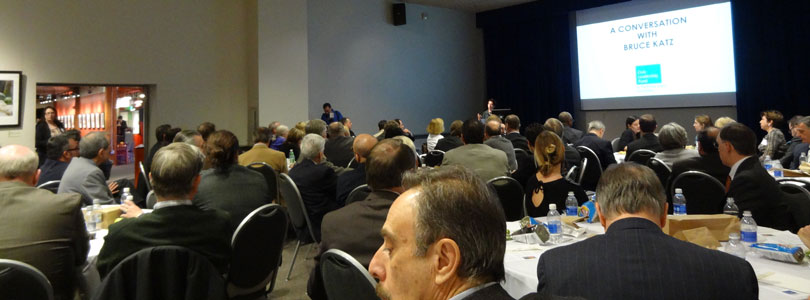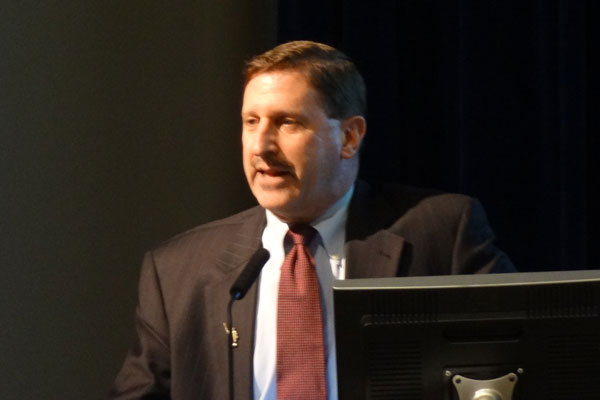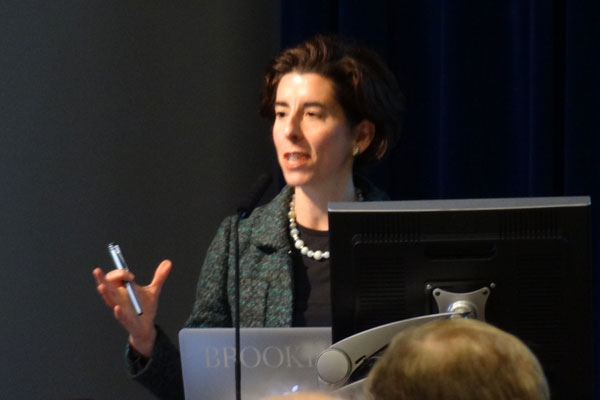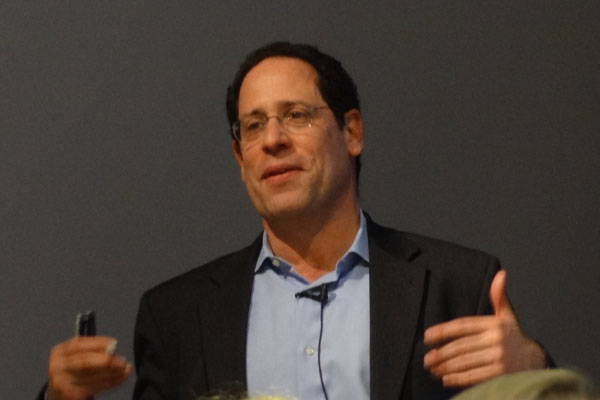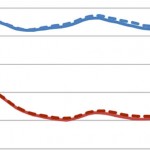02/26/13 – A Conversation with Bruce Katz
12:18 p.m.
I’ve claimed my space at the limited-seating “conversation” that the RI Foundation and General Treasurer Gina Raimondo have arranged with Bruce Katz of the Brookings Institution. The place is filling up (it’s fascinating to watch folks’ seating choices). Not all the tables are filled, so if you’re on the waiting list that RI Foundation head Neil Steinberg’s last email said exists and you’re standing by the door, you might want to get your car keys.
12:29 p.m.
I don’t see Linda Katz from the Economic Progress Institute. That might have been a record for me, with three unrelated Katzes in the same room.
The lunch at the Johnson & Wales culinary museum was literally a pick-your-own-sandwich bag lunch. Excellent sandwiches, but some audience grumbling about stale brownies. I thought it was maybe a culinary-specialty thing that my taste buds weren’t sufficiently developed to appreciate, but it did inspire me to eat an apple instead, which is a good thing.
12:34 p.m.
Steinberg is kicking the event off.
12:35 p.m.
Steinberg: “This is not an announcement of another report.” It’s “action oriented.”
12:36 p.m.
Treasurer Raimondo is up. The “they” who “have to fix the economy is you” (meaning the people in the room). (Apparently, we are the ones we’ve been waiting for.)
12:37 p.m.
Raimondo is hitting on the theme that I always harp on at these events: this is fun and all, for us, but there’s a state full of people “out there” who are struggling to get by.
12:39 p.m.
Bruce Katz’s approach, she says, is “a bottom-up vision,” starting with grassroots, local efforts and buy-in. (If we think about those struggling Rhode Islanders, though, it might be better called a “bottoms-up vision.”)
12:40 p.m.
“Unless we all come together, and unless we all contribute something to the revitalization of the economy, it’s not going to happen,” Raimondo says. She ties this with the Make It Happen event, the legislature’s efforts, the governor’s “sustainable living” studies, saying it’s the perfect time to act.
(From her introduction, frankly, it sounds like Katz’s “approach” is already baked into the “equity” program the U.S. Housing and Urban Development grant that the governor is currently following.)
12:43 p.m.
Bruce Katz says he went to summer camp in Narragansett (Camp Fuller) and that’s when he decided to go to Brown.
12:44 p.m.
Katz says the “brutal challenge” that we face is high unemployment. Nationally and in Rhode Island, poverty has seen a “quantum leap” in the past decade, partly because of the Great Recession, but partly because of the “failed business model” that exports manufacturing.
He says by 2023, the federal government will have “left the state,” leaving “basically a failed state.” He says we’ll have to rely on local and state activity to advance. (That’s what I’ve been thinking as I’ve heard all the talk about what the sequester will do to Rhode Island… that it’s time to take control of our own destiny and stop expecting to be the “first in last out” of every recession, as the governor and speaker of the House have mentioned accepting.)
12:49 p.m.
Katz: We have to stop the “political rhetoric” about a green economy and just move forward with innovation.
Looking at metro areas, Katz says most of the rising cities are in Asia, with most of the failing cities in Europe and a few in the U.S. “Going forward, growth is going to come from without,” meaning exports to other areas of the world.
12:51 p.m.
Katz says the issue of increasing minorities isn’t an “equity” question, it’s a competitiveness issue: we’ve got to bring our growing minorities up to speed.
12:53 p.m.
He says Brookings loves Rhode Island because the whole state is a metropolitan area, 100%. We’re going through “a shock decade” because everything’s falling apart, here.
He says the jobs that we’re creating don’t pay as well as the jobs we’ve lost in Rhode Island: “You’ve got to intervene in the fundamentals of the economy.”
12:55 p.m.
Katz: Try to get your advanced industries growing at a faster rate in order to move forward the rest of the economy.
12:56 p.m.
On green jobs: “You need to understand what your specialties are and who your competitors are.” (This is the part of the presentation where I begin to wonder who “we” are? Is he saying that “we” need to hand the reins to the political class that runs the government to make the final decisions and plan our lives for us?)
12:57 p.m.
Mentions “smart growth” to make sure that people from around the state can get to the jobs that “we’re” creating.
Turning to the activities of Brookings, he says they don’t do reports. That’s “shelfware.” They offer action plans, as if they’re coaches. (From think tank to progressive consulting firm?)
The plan starts with:
* Know your market niche
* Identify a regional economic vision and mission
* Identify strategies and goals
* Specify products, services and policies
* Develop an operational plan
* Develop a financial plan
And one other that I missed. This is starting to sound like a sales pitch for Brookings’ new consulting services.
1:01 p.m.
He says people more and more want to live near where they work. (I’d suggest that there’s a free market app for that.)
1:03 p.m.
He’s going over some projects that they’ve done, offering a three-word imitation of Rahm Emmanuel in Chicago. Katz: Small family-run companies of 50 employees or so need government to take care of tasks like finding outside contractors for them.
1:05 p.m.
He says Brookings helped Chicago find hundreds of millions of dollars that is currently “slated” to be saved.
Brookings has also been active in Nevada, which is sort of the “wreckage of the recession,” because the state went crazy building houses. Then they worked with the Republican governor and Democrat legislature to implement the plan.
“Nevada is growing up, basically becoming an adolescent.”
1:08 p.m.
We need to “join up” all of the aspects of local society: business, philanthropic, government.
“You’ve gotta basically design the whole process, so that there’s a whole sequence of initiatives.”
1:09 p.m.
Scott Wolf gets the first question/comment. He highlights that RI doesn’t have great access to public transportation, but does have “good bones” (Katz’s phrase) for building the economy he’s talking about. He says we ought to have more investment in transportation.
Katz suggests the question: “how do you level the playing field so that redevelopment is as simple and affordable” as “greenfield” development. (He didn’t say whether “leveling the playing field” means bringing costs down in urban areas or driving it up elsewhere.)
“Every city in the United States would kill for that!” meaning the open land available from the 195 redirect.
1:13 p.m.
Katz says our “jobs problem” is issues numbers 1 through 5 for Rhode Island.
1:14 p.m.
Next question/comment from a businessman I don’t know, who asked if we can’t just do this without the government.
Katz: There’s one “category of stuff” that the private sector will drive, but there’s another category of stuff in which government is essential.
He used an analogy of who sets up the parade; I think he meant the government did that… clearing the road, organizing things, and so on.
1:17 p.m.
Responding to a question about manufacturing from a local entrepreneur, Katz says societies used to push manufacturing out of the living spaces because it was dirty, but it’s clean now, and we’ve got to “rebuild” to account for that change.
“The post-industrial economy is unbelievable nonsense.”
1:19 p.m.
Next question: “What are the critical elements of an innovation district?”
Katz: you set up an area where there’s a nucleus of innovative activity, and people want to live near where they work. The result is a “mash-up” of communities that ends up attracting new sectors, businesses, and so on.
Brown and the hospital cluster is “a potential innovation district.”
1:21 p.m.
Last question: what are the barriers that you’ve seen.
Katz: The number one barrier is waiting for the Federal government. After Reconstruction, Americans built up the Federal government. “They have ceased to function. They’re a failed state.”
“No one’s coming to save the state of Rhode Island.” It’s on us.
He says we’ve got “the best” Congressional delegation in the country, but they live in a dysfunctional setting.
“We’ve got to do this from the bottom up.” He calls it the “metropolitan revolution” that “has to happen this century.”
1:24 p.m.
In closing remarks, Steinberg says this event shows how unique Rhode Island is, because we could set something like this up in 24 hours.
Referring to the PolicyLink report showing the racial generation gap released last week, Steinberg says that if he were a young entrepreneur, he would focus his products on aging Boomers and young people “of color.”

